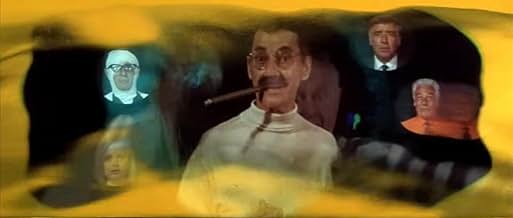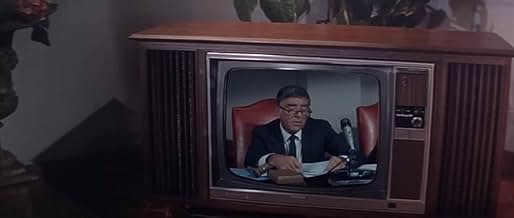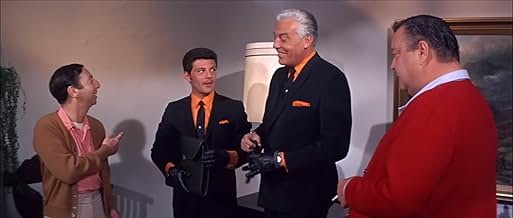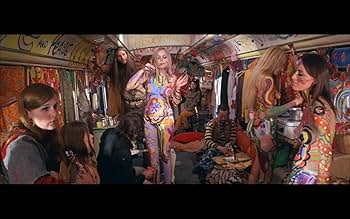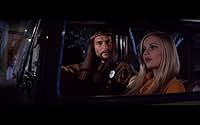Comedia psicodélica sobre el ex-gángster Tony Banks, a quien un capo de la mafia ha llamado a salir de su retiro para llevar a cabo un golpe contra su compañero mafioso "Blue Chips" Packard.Comedia psicodélica sobre el ex-gángster Tony Banks, a quien un capo de la mafia ha llamado a salir de su retiro para llevar a cabo un golpe contra su compañero mafioso "Blue Chips" Packard.Comedia psicodélica sobre el ex-gángster Tony Banks, a quien un capo de la mafia ha llamado a salir de su retiro para llevar a cabo un golpe contra su compañero mafioso "Blue Chips" Packard.
- Dirección
- Guionista
- Elenco
- Dirección
- Guionista
- Todo el elenco y el equipo
- Producción, taquilla y más en IMDbPro
Opiniones destacadas
In a way this could also be titled "The Day the Mob Dropped Out." Anyway, a good roster of late-60s Hollywood appears at least briefly in this LSD-laced caper gone wrong. Retired hitman Tony Banks (Gleason) is approached by old pal Hechy (Romero) to do one last job--on his one-time best friend "Blue Chips" Packard (Rooney), who's turning state's evidence. Tony refuses, but is "pressured" into going along, and gets sent to a remote prison, where Packard is being held.
In the meantime Tony's wife Flo (Channing) seeks help from Hechy's protegé Angie (Avalon) in contacting crime-kingpin "God" (Marx, in his final film appearance), to persuade him to let Tony out of it. Angie refuses to take Flo to see "God"--but doesn't mind taking their teenaged daughter Darlene (Hay) and her hippie boyfriend Stash (Law) out to "God's" yacht. Flo follows them with a gang of Stash's friends.
Tony, after an accidental acid experience via his cellmate the Professor (Pendleton)'s stationery, plots with him to escape by tripping out all the guards and inmates. This done, they fly out of the compound in a makeshift balloon, which the hallucinating tower guards (Clark and singer-songwriter Harry Nilsson, who also composed the soundtrack) mistake for a flower. The balloon heads seaward, drifting toward "God's" hideaway. Channing sings the title song during the big finish.
Some good laughs and insights, and social commentary of the day, not to mention tons of cameos. Raises a few points about LSD's former psychiatric uses, and leaves you wondering if it wasn't all just a bad trip. --A late-70s issue of "High Times" claims Groucho 'dropped' as a way of preparing for his role, and had a pleasant experience. Nilsson said later in an interview he had never used LSD at the time of filming, and merely played drunk.
In the meantime Tony's wife Flo (Channing) seeks help from Hechy's protegé Angie (Avalon) in contacting crime-kingpin "God" (Marx, in his final film appearance), to persuade him to let Tony out of it. Angie refuses to take Flo to see "God"--but doesn't mind taking their teenaged daughter Darlene (Hay) and her hippie boyfriend Stash (Law) out to "God's" yacht. Flo follows them with a gang of Stash's friends.
Tony, after an accidental acid experience via his cellmate the Professor (Pendleton)'s stationery, plots with him to escape by tripping out all the guards and inmates. This done, they fly out of the compound in a makeshift balloon, which the hallucinating tower guards (Clark and singer-songwriter Harry Nilsson, who also composed the soundtrack) mistake for a flower. The balloon heads seaward, drifting toward "God's" hideaway. Channing sings the title song during the big finish.
Some good laughs and insights, and social commentary of the day, not to mention tons of cameos. Raises a few points about LSD's former psychiatric uses, and leaves you wondering if it wasn't all just a bad trip. --A late-70s issue of "High Times" claims Groucho 'dropped' as a way of preparing for his role, and had a pleasant experience. Nilsson said later in an interview he had never used LSD at the time of filming, and merely played drunk.
A much-maligned classic, this psychedelic gem came late in the career of director Otto Preminger, possibly at a time during which he was hoping to find a new niche. Clearly, this wasn't it, as the films he went on to do became far slower and subdued. Too bad, really, as there's some great stuff herein. An excellent cast weaves its way through a confusing plot, as follows: Jackie Gleason has retired from the mob and lives happily enough with wife Carol Channing and turtle-faced lackey Arnold Stang, the latter of whom gets iced (and prematurely, I say let Stang stay in the picture!) when George Romero and Frankie Avalon try to persuade Gleason to pull a hit for the mob leader (`God' Groucho Marx living in luxury on a boat with skinny Donyale Luna). Gleason finally agrees, and disappears to prison, cellmates with a peace-speaking mad scientist-looking Austin Pendelton. Meanwhile, Channing, pretty teenage daughter Alexandra Hay and her hippie boyfriend John Philip Law (who goes by `Stash') all become close friends when mom lets his hippie commune live in their house. Channing and Fay go (separately) to seduce Avalon to find out to where Gleason has gone. In prison, Gleason accidentally lets on to his hit, potential squealer (and squeal he does) Mickey Rooney (at the time in his sixth decade of filmmaking!), and further blunders when he writes a letter home and licks one of Pendelton's LSD-soaked envelopes. After a mesmerizing yet stupid trip sequence, Gleason decides not to make the hit and goes into conference with Pendelton. It's right around here that things get very manic, with an acid party in jail on the day that warden Burgess Meredith stops by to eat with the prisoners. Gleason and company make their escape while everybody's tripping their ears off (including tower guard Harry Nilsson and switchboard operator Slim Pickens), and the cast assembles for a bizarre conclusion on Marx's boat. No easy whodunit, this. That Paramount would make a production with a cast and crew like this clearly indicates that the rule-less environment of 1968 sent the studios scrambling. Furthermore, the gimmick of presenting some of Hollywood's best known faces feigning acid trips acts as evidence that in the ensuing hubbub, producers showed heart in making vehement attempts to pander to a difficult target audience. Two serious low points may leave people with a rotten taste in their ears: Channing has a musical number near the end of the film that advocates a free-wheeling hippie lifestyle, and Nilsson sings each and every word of the credits, down to the copyright.
This film is unbelievable... Big stars, a big Hollywood director... and what they came up with is the movie equivalent of a car wreck!
You don't want to look, but you find yourself unable not to.
Don't get me wrong, I've seen this film a dozen times and it still blows my mind how this ever got put on film. You won't believe your eyes or ears!
And Groucho Marx and half of the cast never looked more worse for wear.
By far, this is one of my favorite "bad" films. Watch it... and then blame the dog!
You don't want to look, but you find yourself unable not to.
Don't get me wrong, I've seen this film a dozen times and it still blows my mind how this ever got put on film. You won't believe your eyes or ears!
And Groucho Marx and half of the cast never looked more worse for wear.
By far, this is one of my favorite "bad" films. Watch it... and then blame the dog!
After watching Skidoo tonight all I can ask is what was Otto Preminger thinking when he did this film? Better yet what were all these talented people thinking when they signed on?
The plot has Jackie Gleason, once the mob's number one hit-man, but now retired and living with wife Carol Channing and daughter Alexandra Hay who has taken up with the hippie lifestyle and some hippies, much to the consternation of Gleason and Channing. Those two alone as parents might make anyone want to join a commune.
Cesar Romero and Frankie Avalon bring a message from God or at least that's what syndicate boss Groucho Marx. Groucho wants mob informer Mickey Rooney killed, but Mickey's in prison. Never mind the mob can do anything, bust Gleason into prison and bust him right out once the job is done. But Rooney won't let people near him, but since Gleason's an old friend he'll be vulnerable to him. Which is what Groucho is thinking.
Since Gleason balks, Groucho captures Alexandra Hay and brings her on his yacht from where he runs things. At that point with Marx having him by the short hairs, Gleason agrees to the contract.
The big idea is to get the entire prison tripping on LSD so no one will interfere. But of course things do go wrong as you'll see if you care to watch the film.
No matter how many big names were packed into Skidoo, nothing could get this picture off the ground. Otto Preminger packed the film with a whole lot of people he had used in previous films like Peter Lawford, Burgess Meredith, Slim Pickens, but all to no avail. The jokes fell flat as a punctured soufflé, the situations were just not funny, in fact even Groucho apparently wasn't in the mood to ad-lib any of his patented humor.
In fact Groucho playing a character called God WAS the funniest thing in the film. It has serious theological implications for those of us who thought George Burns or Morgan Freeman was God.
In its own way Skidoo was as big a disaster, even bigger than Plan Nine From Outer Space. And Preminger had a much bigger budget to work from.
The plot has Jackie Gleason, once the mob's number one hit-man, but now retired and living with wife Carol Channing and daughter Alexandra Hay who has taken up with the hippie lifestyle and some hippies, much to the consternation of Gleason and Channing. Those two alone as parents might make anyone want to join a commune.
Cesar Romero and Frankie Avalon bring a message from God or at least that's what syndicate boss Groucho Marx. Groucho wants mob informer Mickey Rooney killed, but Mickey's in prison. Never mind the mob can do anything, bust Gleason into prison and bust him right out once the job is done. But Rooney won't let people near him, but since Gleason's an old friend he'll be vulnerable to him. Which is what Groucho is thinking.
Since Gleason balks, Groucho captures Alexandra Hay and brings her on his yacht from where he runs things. At that point with Marx having him by the short hairs, Gleason agrees to the contract.
The big idea is to get the entire prison tripping on LSD so no one will interfere. But of course things do go wrong as you'll see if you care to watch the film.
No matter how many big names were packed into Skidoo, nothing could get this picture off the ground. Otto Preminger packed the film with a whole lot of people he had used in previous films like Peter Lawford, Burgess Meredith, Slim Pickens, but all to no avail. The jokes fell flat as a punctured soufflé, the situations were just not funny, in fact even Groucho apparently wasn't in the mood to ad-lib any of his patented humor.
In fact Groucho playing a character called God WAS the funniest thing in the film. It has serious theological implications for those of us who thought George Burns or Morgan Freeman was God.
In its own way Skidoo was as big a disaster, even bigger than Plan Nine From Outer Space. And Preminger had a much bigger budget to work from.
I like a good bad movie. I can go on and on about how wonderful "The Incredibly Strange Creatures Who Stopped Living and Became Mixed-Up Zombies" is - and I have. And I don't need those MST3K idiots adding lame improv chatter to make a bad film more enjoyable! So I had been looking forward to "Skidoo" for years. I finally watched it last night, after procuring a copy on eBay (pretty much the only place where you can find this film, currently).
My reaction, in a nutshell: Blah. Yuck. Ho hum.
It's pointless to say more, especially when so many "Skidoo" fans have already weighed in - quite eloquently, I might add - within these comments pages. But I will say this: Usually on the IMDb, when you see so many well-written praises for a famous train wreck of a film, you get the feeling that this is something to see. Don't be snowed as I was! What most of these folks are not telling you is that "Skidoo" is meant to be a wacky comedy. But it's simply a deadening, painful-to-watch document of the twilight of many a great performer's career, where, before either dying or retreating to the safety of TV movies, the cast - some game, some barely even trying (I'm looking at you, Groucho Marx) - flounder in this pathetic attempt by the dinosaurs of 1950's Hollywood to try to stay relevant by making a "hippie movie."
This film is flat, boring, pretentious and hopelessly uncampy. It has the distinctively ugly look of late 60's studio cinema, and like many of those other strident, unfunny all-star comedies of the era ("The Great Race," "The Russians Are Coming! The Russians Are Coming!" et al), it's just plain awful.
My reaction, in a nutshell: Blah. Yuck. Ho hum.
It's pointless to say more, especially when so many "Skidoo" fans have already weighed in - quite eloquently, I might add - within these comments pages. But I will say this: Usually on the IMDb, when you see so many well-written praises for a famous train wreck of a film, you get the feeling that this is something to see. Don't be snowed as I was! What most of these folks are not telling you is that "Skidoo" is meant to be a wacky comedy. But it's simply a deadening, painful-to-watch document of the twilight of many a great performer's career, where, before either dying or retreating to the safety of TV movies, the cast - some game, some barely even trying (I'm looking at you, Groucho Marx) - flounder in this pathetic attempt by the dinosaurs of 1950's Hollywood to try to stay relevant by making a "hippie movie."
This film is flat, boring, pretentious and hopelessly uncampy. It has the distinctively ugly look of late 60's studio cinema, and like many of those other strident, unfunny all-star comedies of the era ("The Great Race," "The Russians Are Coming! The Russians Are Coming!" et al), it's just plain awful.
¿Sabías que…?
- TriviaOtto Preminger originally wanted Bob Dylan to score the movie. He invited Dylan and his wife to a screening of a rough cut of the movie in Preminger's Hollywood mansion. After the screening Dylan surprised everybody from his entourage, who thought the film was a disaster, by requesting a second screening but at one condition: he wanted to be left alone with his wife in the house during it. Preminger happily obliged, convinced that Dylan would accept the job. However, Dylan showed no further interest in the movie. He acknowledged later that he and his wife weren't interested at all by the film but they loved the mansion's style so much that they requested this second screening to freely explore it, write down what they liked and take inspiration for their own house.
- Citas
Stash: Violence is the sign language of the inarticulate.
Tony Banks: What is he talkin' about? Do you know what he's talkin' about?
- Créditos curiososAt the end of the film, Harry Nilsson sings all the credits that appear onscreen, with occasional side notes (e.g. "a good friend", or "thanks").
- ConexionesFeatured in Inside the Marx Brothers (2003)
Selecciones populares
Inicia sesión para calificar y agrega a la lista de videos para obtener recomendaciones personalizadas
- How long is Skidoo?Con tecnología de Alexa
Detalles
- Fecha de lanzamiento
- País de origen
- Idioma
- También se conoce como
- Skidoo - Ein Happening in Love
- Locaciones de filmación
- Alcatraz Prison, Alcatraz Island, San Francisco Bay, California, Estados Unidos(aerial shots of prison)
- Productora
- Ver más créditos de la compañía en IMDbPro
Contribuir a esta página
Sugiere una edición o agrega el contenido que falta


